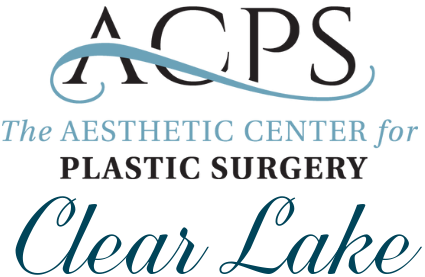Expert Face Procedures for a Youthful Look
Conveniently located to serve Houston, TX
 You want to put your best face forward, but over time, gravity, sun damage, dry air and even stress begin to take their toll on your skin. Ranging from a lack of tone and texture to the development of jowls, folds and fat deposits, aging robs you of your youthful appearance and may impact your self-confidence. At ACPS Clear Lake, Houston Plastic Surgeons Dr. Hustak and Dr. Wentworth have a number of both non-invasive and surgical options to help you fight the aging war!
You want to put your best face forward, but over time, gravity, sun damage, dry air and even stress begin to take their toll on your skin. Ranging from a lack of tone and texture to the development of jowls, folds and fat deposits, aging robs you of your youthful appearance and may impact your self-confidence. At ACPS Clear Lake, Houston Plastic Surgeons Dr. Hustak and Dr. Wentworth have a number of both non-invasive and surgical options to help you fight the aging war!
Non-Invasive Facial Rejuvenation Options
Beginning at the non-surgical end of the spectrum, ACPS Clear Lake offers a full line of Private Label Skin Care products. These products were specifically created by Dr. Hustak and Dr. Wentworth for their ability to improve your skin’s look and feel. In addition, twice each month, our specialist offers both photo-rejuvenation and hair removal in our office, and Dr. Hustak and Dr. Wentworth perform sclerotherapy treatments for those wishing to improve the look of spider veins in the legs.
Dr. Hustak and Dr. Wentworth also perform injectable rejuvenation in our Houston plastic surgery practice, with wrinkle relaxers like BOTOX® Cosmetic and wrinkle filler Juvéderm®. BOTOX® injections will smooth your more intense wrinkles, creases and fine lines. Juvéderm® fills in wrinkles and, over time, stimulates the production of collagen and elastin beneath your skin’s surface.
Facial Surgery Options
You have a number of options at our Texas plastic surgery practice to correct more severe problem areas around your face, neck and even ears. Dr. Hustak and Dr. Wentworth provide complimentary consultations for any of these procedures, during which she will answer your questions, evaluate your fitness for cosmetic surgery, and provide detailed information on the procedures. At ACPS Clear Lake in Houston, those procedures include the following:
-
- Eyelid Lift: Aging or genetically drooping eyelids can make you look tired. An eyelid lift is a simple procedure that will leave you looking more youthful and refreshed!
To learn more about each of these procedures, visit our Virtual Education Library.
Good Candidates for Face Procedures
Patients who have issues that can be resolved through non-invasive or surgical face procedures would be good candidates for these options. To get the best results, patients should be in good health, whether they are intended for surgery or less invasive treatments.
If patients are interested in undergoing a surgical face procedure, they must quit smoking several weeks beforehand. This will help avoid complications and a prolonged healing process.
Your Consultation
To find out which face procedures patients need, scheduling a consultation is necessary. The patient will discuss their needs and goals with Dr. Hustak and Dr. Wentworth, who will then recommend an ideal face procedure or treatment.
Patients will need to answer a few questions about their medical history, including information regarding all current medications. Patients will be encouraged to ask questions and raise any concerns they may have.
How Much Do Face Procedures Cost?
The cost for a patient’s face procedure will depend on which specific treatment or procedure is chosen. Prices can also be influenced by whether or not more than one treatment is utilized.
FAQs About Facial Surgery Procedures
To help you make an informed decision, we’ve compiled some frequently asked questions about face procedures, addressing pain levels, treatment longevity, and post-procedure care.
1.How much pain should I expect during a face procedure?
Pain levels can vary depending on the procedure, but most face procedures are performed under local or general anesthesia to ensure comfort. Mild discomfort and swelling are common after surgery, but this can be managed with prescribed pain medications. Your surgeon will discuss pain management during your consultation.
2.How long do the results of face procedures last?
The longevity of results depends on the type of procedure. Non-surgical treatments like Botox and dermal fillers typically offer temporary results that may last several months to a year. Surgical procedures, such as facelifts, can provide long-lasting results, often up to 10 years or more. These will be discussed during your consultation.
3.What is the typical downtime and post-procedure care for face procedures?
Downtime and post-procedure care also vary by procedure. Non-surgical treatments usually have minimal downtime, allowing you to return to your daily activities almost immediately. Surgical procedures may require a week or more of recovery, including restrictions on physical activity.
Following your surgeon’s post-operative care instructions is crucial to achieve the best results and minimize complications.
4.How long should I wait before returning to work and social activities after a face procedure?
The downtime needed before returning to work and social activities varies by procedure and the individual’s rate of healing. Non-surgical treatments often have little to no downtime, while surgical procedures may require one to two weeks or more for swelling and bruising to subside.
5.How should I care for my incisions or treated areas after a face procedure?
Proper incision or treated area care is crucial. Your surgeon will provide detailed instructions, including keeping the area clean, applying prescribed ointments, and avoiding direct sunlight exposure to prevent scarring and promote healing.
6.When can I resume my regular skincare routine after a face procedure?
You should avoid using your regular skincare products for a specified period after a face procedure. Your surgeon will guide you on when it’s safe to reintroduce your skincare regimen to ensure it complements the healing process.
7.Is there anything I should avoid during the recovery period?
During the healing process, it’s essential to avoid strenuous physical activities, smoking, and excessive alcohol consumption. Additionally, your surgeon may recommend specific dietary and lifestyle adjustments to support optimal recovery.
8.How can I manage post-procedure swelling and bruising?
Swelling and bruising are common after face procedures. Your surgeon may suggest using cold compresses, keeping your head elevated, and taking prescribed medications to manage these symptoms. Following these recommendations can help minimize discomfort.
Arranging a Consultation
Address your concerns about your face with our surgical and non-surgical face procedures in Webster, TX. To schedule your one-on-one consultation with Dr. Hustak or Dr. Wentworth, call 713-799-9999 or send us your contact information. For more on our consultation process, visit our Consultation Page.



